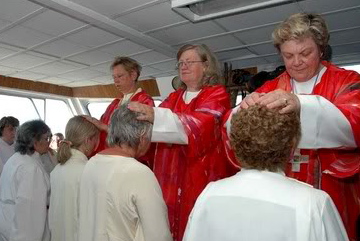Here’s part of one man’s long answer, from the Sunday magazine of the Boston Globe:
I like my faith in purple – the purple neither of mourning nor of majesty, but the purple of twilight and of the morning, the purple of thoughtful, pensive times. When I think about my faith, I think about it in those kinds of purples. They suffuse it and they color its edges, too, because that is where my faith is nowadays. It is a place in me, not a structure outside of myself. Gold and white are too triumphant, and black is too stark and final, and I don’t feel stark and final about it yet. It is a place of purple, where days end and begin again.
I entered the Roman Catholic Church on a winter’s day in 1953 in Shrewsbury. My uncle the Rev. Thomas Pierce poured the water and another uncle, the Rev. Michael Pierce, stood beside me and my parents. I had no idea what was going on, so I had to have the whole thing explained to me over the next 22 years or so, by my parents, by the Sisters of St. Joseph, by the Xaverian Brothers, and, finally, by the Jesuit fathers of Marquette University, who went a long way toward demonstrating how wrong were so many of the people who’d explained it all to me previously.
So, my spiritual biography is a bit serendipitous. The engine behind it was curiosity born in skeptical wonder. As I moved through the years, I questioned my faith more, not less. Almost all of that questioning concerned whether or not my Catholic faith was particularly suited to the institution of the Catholic Church. This was unsettling in the best of times, and these are not the best of times.
[snip]
My friend the Rev. Walter Cuenin is a good priest who voiced his disapproval of the handling of the sexual-abuse scandal in the Boston Archdiocese and later was forced to leave my home parish in Newton in 2005 because the archdiocese didn’t approve of the way finances were being handled. It was a display of ward heeling that would have embarrassed Mayor Curley. Cuenin always used to tell a story during one of his homilies about a man recently arrived in heaven. His guide takes him down a street on which there are several houses of worship. This is where the Buddhists pray, he is told, and over here is the Lutheran Church. At the end of the street is one last church. The guide tells the newly arrived person to be very, very quiet.
“That’s the Catholic Church,” says the guide. “They think they’re the only ones here.”
I have been asked, a lot, given everything that’s gone on over the past few years, why I remain a Catholic. The simplest answer is found somewhere between the two curious extremes of public religiosity in the country today. On the left we have the new atheists – best exemplified by people like journalist Christopher Hitchens and writer Sam Harris, and worst exemplified by comedian Bill Maher, whose atheism seems to be little more than Ivy League snobbery – and all the way over on the right we have the fundamentalist Christianity of the suburban mega-church and the Left Behind novels.
As to the latter, I think I can say without equivocation that I simply don’t want what they call a personal relationship with Jesus Christ. At the moment, I have a personal doctor, a personal trainer, and a personal fencing coach, none of whom I see as much as I should. One thing I always liked about being Catholic is that, while we could be insufferably vaunting about being the One True Church – which was the basis for Walter’s joke, after all – we by and large didn’t proselytize that way, and once you learned anything about church history, you could dispose of the One True part pretty easily. (The Episcopal Church doesn’t count? The Book of Common Prayer doesn’t count? Really?) I do not need a personal Lord and Savior. Not in that sense, anyway. I’m happy sharing him with the rest of what the fathers at the Second Vatican Council called the “people of God.”
[snip]
Asking me why I am still a Catholic is rather like asking me why I’m still an American. After all, it can be argued that, over the past decade or so, with acts like waterboarding, the country has abandoned a lot of what made it unique in history and suffered a profound loss of faith in its founding ideals. (I’ve argued that myself.) I am still an American because, as Herman Melville put it, the Declaration of Independence makes a difference. I remain a Catholic because the Gospels make a difference. In both cases, ideals are set out, pathways delineated, and through them, our shortcomings can be measured as precisely as possible. In the former case, the torturers and their bureaucratic masters cannot contradict the verdict of that measuring, and in the latter, the crimes against conscience perpetrated by the institutional hierarchy of the Church cannot stop the slow, painful evolution from moving forward. I can stay a Catholic because of what I’ve learned about being an American. I am, in my own way, a Madisonian Catholic. To borrow a line from Thomas Jefferson, my church neither picks anyone’s pocket nor breaks anyone’s leg. Most important of all, it is mine – a personal church, if not a personal Savior.
There’s much more. Check it out.

